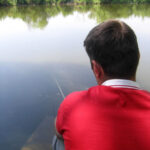Any short analysis of this book must select a few specific areas to scrutinize. I have chosen a few: the Author’s detailed and beautiful descriptions, the Protagonist speaking the Author’s thoughts and the interesting use of other author’s quotes to start the corresponding chapters. Mr. Cooper adds interest for the reader with his lush details in the descriptions of the wilderness, wildlife, characters and conversations. The Author opens each chapter with a different quote to provide a hint of the chapter’s contents that follow; this creates a continual interest for the reader to keep on reading. Mr. Cooper uses Natty Bumppo, our Protagonist, to voice the Author’s opinions that the local culture will spread and affect the surrounding wilderness and the resulting human disturbances to the natural land are regrettable. I will show that in The Pioneers the writing presents a rich, opulent nature, the use of quotes adds to the substance of each chapter and the Author’s subtle points about conservation of nature are frequently mentioned (Biscay, 2007) (Cooper, 1823) (Lapp, 1989) (Collins, 2007).
In the entire novel, Mr. Cooper consistently utilizes vibrant descriptions and detailed imagery to set each scene for the reader and make the locations the equal to his cast of characters (Cooper, 1823) (Lapp, 1989). Using vivid phrases like “The vales are narrow, rich, and cultivated, with a stream uniformly winding” and “with the long shadows of the pines on its white surface, lengthening in the setting sun” it is evident that all these details make it easier to visualize this place where our characters live as we read about them (Cooper, 1823) (Collins, 2007).
Mr. Cooper uses unique quotes as an opening for each chapter to create curiosity in the reader’s mind. In Chapter four, the quote is by Falstaff, “How now? Whose mare’s dead? what’s the matter?” and follows it up with the story about the horses and sleigh being stuck dead in the snow with Edwards rescuing all the passengers from possible death. In Chapter thirteen, the quote is a drinking song, “And I’ll drink out of the quart pot. Here’s a health to the barley mow” and follows that up with a detailed look at the inn called the “Bold Dragoon” in Templeton. Chapter forty starts with a quote from Shakespeare, “I am dumb. Were you the doctor, and I knew you not?” and afterward ties this to the actions of revealing a hidden grandfather, true ownership of the land and emotional closure (Collins, 2007) (Cooper, 1823) (Lapp, 1989). While reading each quote and the related chapter, the reader has an added sense of the actions and characters that are depicted.
The Author’s feelings about nature and its uses are voiced byNatty Bumppo, who throughout the book makes comments about the need for living off the land and the conservation of the Otsego Lake region’s physical resources. The Author uses the deer hunt on the Judge’s land as one stage for Natty to comment on the use of the animal resources and has Natty say, “I suppose the cretur is to be eaten “(Cooper, 1823). Another time, the Author voices his concern of his characters destroying the natural surroundings when he has Natty Bumppo object to the wholesale clearing of forests by his compatriots. The Author’s concern about the natural resources echoes as an undercurrent throughout this book (Biscay, 2007) (Cooper, 1823) (Lapp, 1989) (Reuben, 2007).
This analysis has only examined a few small areas in the book The Pioneers by James Fenimore Cooper. In my short analysis of The Pioneers, I have shown some examples of Mr. Cooper’s vivid, detailed descriptions, listed some cases when the Protagonist speaks for the Author and given a few illustrations of the quotes that connect each chapter (Cooper, 1823) (Lapp, 1989).
Works Cited
Biscay, M. (2007). James Fenimore Cooper: the voice of the Frontier as general critique. Retrieved May 29, 2007, from SkyMinds.net Web site: http://www.skyminds.net/lit_us/03_literary_independence.php
Collins, M. (2007). Sloughing off the Old Skin: Ideology, Folklore and the Invention of Tradition in the Tales of Washington Irving. Retrieved May 29, 2007, from U.S. Studies Online: The BAAS Postgraduate Journal Web site: http://www.baas.ac.uk/resources/usstudiesonline/article.asp?us=10&id;=31
Cooper, J. (1823). The Pioneers. Retrieved May 30, 2007, from The Literature Network Web site: http://www.online-literature.com/cooperj/pioneers/
Lapp, P. (1989, July). Cooper and his Critics on Character: Distinctiveness, Design and Plausibility. Retrieved May 30, 2007 from James Fenimore Cooper Society Website Web site: http://external.oneonta.edu/cooper/articles/suny/1989suny-lapp.html
Reuben, P. Chapter 3: James Fenimore Cooper. PAL: Perspectives in American Literature- A Research and Reference Guide. Retrieved May 29, 2007 from csustan.edu Web site: http://web.csustan.edu/english/reuben/pal/chap3/cooper.html

